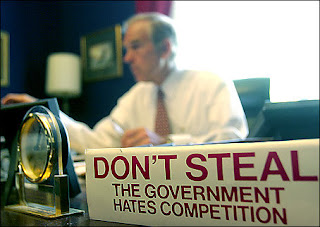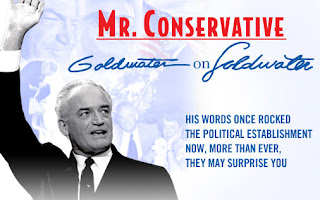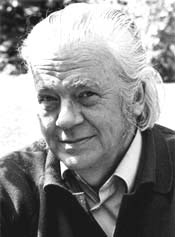
Tonight, I went out to King's Tavern. The band was pretty darn good. Amy the bartender told me that it was called Crossroads. Anyway, I met the drummer during one of their breaks. He's a very good drummer, and looks very interesting with his caucasion Rastafarian-hippy kind of look. I had noted that he had a Ron Paul sticker on his drum. And when I told him that I teach philosophy, I started to hear all about a movie called "America:
 From Freedom to Facism." He was happy to know that I knew that the income tax and the IRS are unconstitutional, and he went on to tell me some of what he'd picked up from his research, including this movie.
From Freedom to Facism." He was happy to know that I knew that the income tax and the IRS are unconstitutional, and he went on to tell me some of what he'd picked up from his research, including this movie.Of course, he and I are coming at things from very different
 angles. He's an independent musician, and I work for the State of California as a university professor. I'm in favor of raising taxes so that we can pay for education. He, on the other hand, wants the government out of the income-tax-collection business, because he sees them as corrupt and using our money for so much evil in the world. I can't disagree with him about the misuse and the evil. So, where does that leave us? I went through a period when I was younger when I was very much under the persuasion of the libertarians. I was a big fan of Karl Hess, former speech-writer for Barry Goldwater, who wrote the line "Extremism in the defense of liberty is no extreme." I still agree with that to a large extent. Liberty is one of the greatest goods that we enjoy, and is one of the only things in this world that might be world fighting and dying for. Well, anyway, according to Hess, when Goldwater lost the election, the Johnson administration got the IRS after Hess as part of a political retaliation. I don't know if that's true, or not. But the interesting thing is that Hess sent the IRS the Declaration of Independence, and he started working on a barter system, welding in exchange for goods and services. He also went on to start a community in Washington, D.C. based on the barter system. He wrote a book about that called Community Technology. It's all fascinating stuff. Hess had people in D.C. growing crops on the rooftops and starting fish farms in the basement. His goal was to make an independent, self-sufficient libertarian community. I was fascinated with all of that. Anyway, read his book Dear America sometime if you're interested in Hess.
angles. He's an independent musician, and I work for the State of California as a university professor. I'm in favor of raising taxes so that we can pay for education. He, on the other hand, wants the government out of the income-tax-collection business, because he sees them as corrupt and using our money for so much evil in the world. I can't disagree with him about the misuse and the evil. So, where does that leave us? I went through a period when I was younger when I was very much under the persuasion of the libertarians. I was a big fan of Karl Hess, former speech-writer for Barry Goldwater, who wrote the line "Extremism in the defense of liberty is no extreme." I still agree with that to a large extent. Liberty is one of the greatest goods that we enjoy, and is one of the only things in this world that might be world fighting and dying for. Well, anyway, according to Hess, when Goldwater lost the election, the Johnson administration got the IRS after Hess as part of a political retaliation. I don't know if that's true, or not. But the interesting thing is that Hess sent the IRS the Declaration of Independence, and he started working on a barter system, welding in exchange for goods and services. He also went on to start a community in Washington, D.C. based on the barter system. He wrote a book about that called Community Technology. It's all fascinating stuff. Hess had people in D.C. growing crops on the rooftops and starting fish farms in the basement. His goal was to make an independent, self-sufficient libertarian community. I was fascinated with all of that. Anyway, read his book Dear America sometime if you're interested in Hess.For my part, I decided that libertarianism was too extreme for me. I thought that government had a significant role to play in the world. I began to believe, as I still do, that we need a middle-of-the-road system that aims for an ideal where government is limited, yet does what we need it to do. I opted for the middle way of not too much, and not to little. But that's the trick, isn't it? Deciding where to draw that line! I was persuaded by George Will, Ronald Reagan and Jack Kemp that government had gotten too big and too intrusive, and that it needed to be reigned in. It needed to be more efficient, and I still believe that. I read Jude Wanninski's The Way the World Works, and was swept up in the Reagan revolution of limiting government. I accepted what I still believe: that taxation can become such a burden that it needs sometimes to be scaled back so that we can stimulate more production. But as I argued in an earlier post, there is an optimal level of taxation. Society also needs some things that government does best, including stimulating the economy through some government spending. It's the balance that we must aim for.
To me, the Reagan Revolution went too far. Ronald Reagan had been a Democrat in his early life. He was a depression-era kid who saw the good that F.D.R. did. As far as I know, he didn't reject the New Deal. He just didn't want government to get too big. People like Newt Gingrich, on the other hand, were ideologues who seem to see government as bad, pure and simple, and wanted to go to the other extreme. I voted for Bill Clinton twice because he represented the balance to me. He wanted an efficient government that was neither trying to do too much, nor trying to do too little. The DNC was about taking a
 centrist approach. It was not a "liberal" branch of the Democratic Party, if you define "liberal" as negatively as "tax and spend." Well, everyone in government taxes and spends. Yes, even you Republicans. The question is always how much to tax and spend, and what the government should spend on. The problem for me is that it's not a question of either just spending more, or on cutting the programs. It's wise management of the government, and it's nearly impossible. We have so much to learn. On that last thought, I recommend Schumacher's Small is Beautiful, which argues for economies of scale. There are many things that the Federal Government tries to deal with that would be better handled at the state or local levels.
centrist approach. It was not a "liberal" branch of the Democratic Party, if you define "liberal" as negatively as "tax and spend." Well, everyone in government taxes and spends. Yes, even you Republicans. The question is always how much to tax and spend, and what the government should spend on. The problem for me is that it's not a question of either just spending more, or on cutting the programs. It's wise management of the government, and it's nearly impossible. We have so much to learn. On that last thought, I recommend Schumacher's Small is Beautiful, which argues for economies of scale. There are many things that the Federal Government tries to deal with that would be better handled at the state or local levels.Anyway, meeting "Super Dave" was a kick, and very stimulating to me.
3 comments:
Yes, the middle road in spending is good. Somebody oughta tell Bush that $485 BILLION (and counting-I have a money-counter clicking off on my blog!) is ludicrous. I wonder how it got to this absurdity... Part of it, as Griffin says, is that the conservatives were able to leverage 9-11. This is very interesting--I doubt we'd be in this horrific war without 9-11. Aloha!
They wanted to take down Saddam, and it was only a matter of finding the right excuse. Saddam had nothing to do with 9/11, of course.
Yes, also, taking down Saddam was only part of a larger military strategy. That strategy includes control, even if in some small political sense, of middle eastern countries. It's a mindset. It's a way of comporting your attitudes. It's based on a military-industrial complex mentality and tied into a need to fuel the larger structures (ecomonically) as they existed in the post WWII era and the cold war era. Bush was 18 in 1964--that puts his mentality squarely into that time period. He was a smart young man, and so even McCartyism must have had an effect on him. It's the difference between someone like him, and someone born even 10 years later.
Post a Comment